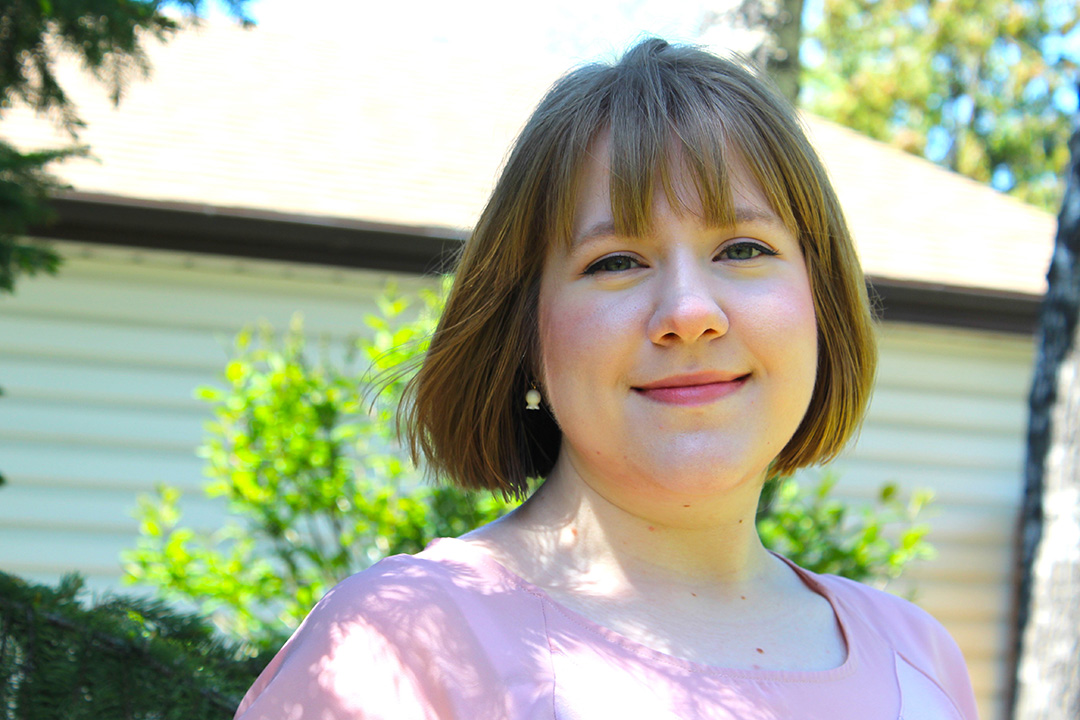
New USask English graduate to be honoured with Rose Litman Medal in Humanities
Megan Gorsalitz will receive her Bachelor of Arts (honours) degree in English during USask's 2021 Fall Convocation
By Shannon BoklaschukMegan Gorsalitz will become a University of Saskatchewan (USask) graduate for the second time in less than two years when she receives her Bachelor of Arts (honours) degree in English this fall.
Gorsalitz previously earned a Bachelor of Arts degree in linguistics in June 2020, before completing her honours degree in English in USask’s College of Arts and Science. She is now set to officially receive her English degree during USask’s 2021 Fall Convocation celebrations, which will be held online on Nov. 10 due to the ongoing COVID-19 pandemic.
“While I do feel a little regretful that my fellow graduates and I aren’t able to celebrate together in person, mostly I feel relieved and I feel proud of myself. The 2020-2021 academic year was, of course, a very difficult year to end my degree on; on top of having to adjust to online schooling and having to focus on my studies despite troubling global news, I had to also think about finishing my degree strong,” she said. “I’m happy, relieved and proud that I pushed through and made it to Convocation.”
Gorsalitz, who was born and raised in Saskatoon, began her studies at USask in the fall of 2016 after completing high school at Holy Cross High School. She excelled as a university student, receiving the Roscoe R. Miller Scholarship for the 2020-21 academic year. She was also twice included on the Dean’s List, which recognizes students whose grades are within the top five per cent of those studying with a full course load in the College of Arts and Science.
At Fall Convocation in November, she will be honoured with the Rose Litman Medal in Humanities. The prestigious prize is awarded annually to the most distinguished graduate receiving a Bachelor of Arts four-year degree or honours degree in the humanities. It’s a fitting award for someone who has always loved books and reading.
“I was fortunate to have some very good English teachers in high school; without them, I’m not sure I would have ever considered studying English seriously,” said Gorsalitz. “What interests me about the subject is how fiction can shape our lives; it’s so fascinating to pick apart all the different parts of a book, story or poem and try to figure out how its author might be trying to influence us.”
For Gorsalitz, having a background in linguistics proved to be helpful in studying English. For example, she found that her previous studies in linguistics enabled her to become especially interested in medieval literature, since medieval varieties of English are so different from modern English.
“Studying medieval literature to me felt like a combination of both my fields of study. Linguistics allowed me to overcome the language barrier and work through Middle and Old English so that I could better appreciate and analyze the literature during my English studies,” she said.
One of the highlights of Gorsalitz’s time at USask was curating the online Pride on the Prairies exhibit when she was temporarily employed as a exhibit and collections assistant at the Diefenbaker Canada Centre. The exhibit, which focuses on queer history in Saskatchewan from 1969 to 2020, was created in partnership with the University of Saskatchewan Students’ Union (USSU) Pride Centre. The online exhibit went live in March 2021.
“Curating Pride on the Prairies was an extremely educating and rewarding experience for me. I learned so much about how to conduct research, perform outreach, as well as, of course, learning so many new things about LGBTQ2S+ history here in Saskatchewan,” she said.
“I feel very fortunate that I was able to work on a project that I was so passionate about—and seeing it all come together at the end as an actual public exhibit was an amazing feeling. If I ever had the chance to work on a project like it again, I would definitely take it.”
Gorsalitz said the best part of studying at USask was the sense of community she noticed on campus. She was also involved in extracurricular activities during her undergraduate years, serving as the secretary of the Society and volunteering at the Museum of Antiquities.
“My favourite memory was the honours colloquium at the end of my final year, when all my fellow honours English students and I got to present our research to our family, friends, professors and peers,” she said. “It was so much fun to be able to show off my hard work and see what my classmates had been working on. My colloquium presentation was on medieval literature—one poem in Middle English and one in Middle Scots—so, for me, the colloquium was a perfect combination of both of my fields of study. It felt like my whole undergraduate experience—both in linguistics and English—lead up to it, so it was very special.”
With her undergraduate education now complete, Gorsalitz is planning to take some time to travel when it’s safe to do so. She is also planning to return to university soon to pursue a master’s degree in English and, eventually, a PhD.
“I’d like to thank all of the students and faculty in the Department of English for being such a huge part of what made my undergraduate experience so positive,” she added.
This fall, 926 students are expected to graduate from USask with 939 degrees, diplomas and certificates. These graduates join a century-old community of close to 165,000 alumni worldwide whose contributions are helping to shape our world. Due to the pandemic, in-person ceremonies will not be held. Instead, there are a variety of opportunities to celebrate. Learn more about the celebrations at students.usask.ca/usaskclassof2021.

